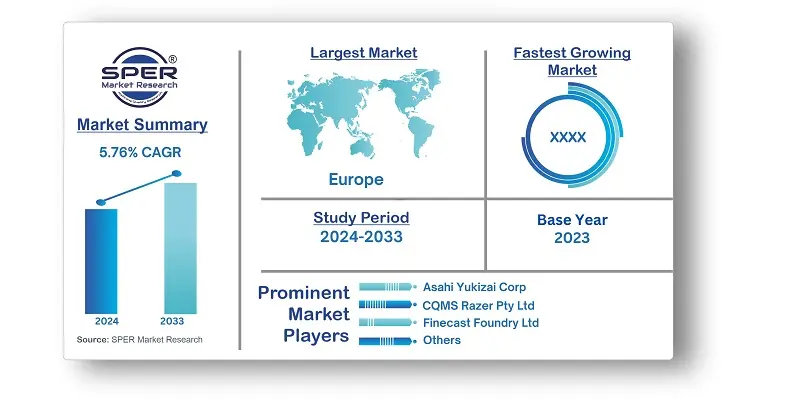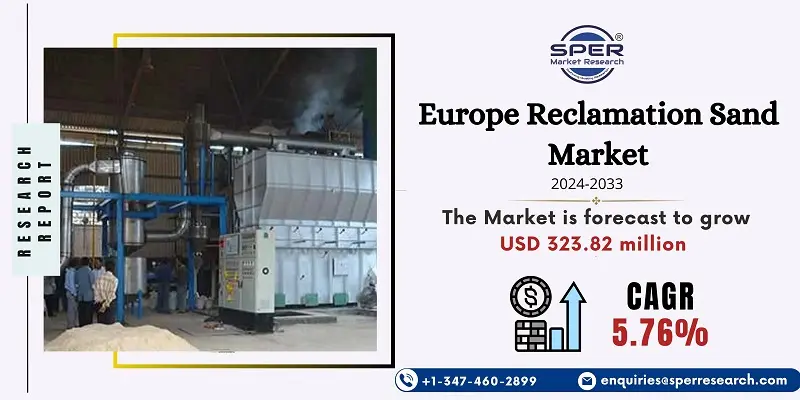
Europe Reclamation Sand Market Growth, Size, Trends, Share, Revenue, Scope and Future Outlook
Europe Reclamation Sand Market Size– By Process, By Application- Regional Outlook, Competitive Strategies and Segment Forecast to 2033
| Published: May-2024 | Report ID: COAM2419 | Pages: 1 - 152 | Formats*: |
| Category : Construction & Manufacturing | |||
- In May 2022: FSP GmbH commissioned a pilot-level water-glass bonded sand reclamation plant at its headquarters in Stuttgart, Germany, to conduct foundry sand reclamation tests. The plant is designed for wet sand reclamation.


| Report Metric | Details |
| Market size available for years | 2020-2033 |
| Base year considered | 2023 |
| Forecast period | 2024-2033 |
| Segments covered | By Process, By Application |
| Regions covered | UK, Germany, France, Russia, Italy, Rest of Europe |
| Companies Covered | Asahi Yukizai Corp, CQMS Razer Pty Ltd, MAT Foundry Group Ltd, Iluka Resources Ltd, Finecast Foundry Ltd, JFE Mineral & Alloy Co Ltd. |
- Construction Companies
- Government and Municipal Authorities
- Real Estate Developers
- Environmental and Engineering Consultants
| By Process: |
|
| By Application: |
|
| By Region: |
|
- Europe Reclamation Sand Market Size (FY’2024-FY’2033)
- Overview of Europe Reclamation Sand Market
- Segmentation of Europe Reclamation Sand Market By Process (Wet Reclamation, Mechanical Reclamation, Thermal Reclamation)
- Segmentation of Europe Reclamation Sand Market By Application (Foundry, Construction, Others)
- Statistical Snap of Europe Reclamation Sand Market
- Expansion Analysis of Europe Reclamation Sand Market
- Problems and Obstacles in Europe Reclamation Sand Market
- Competitive Landscape in the Europe Reclamation Sand Market
- Impact of COVID-19 and Demonetization on Europe Reclamation Sand Market
- Details on Current Investment in Europe Reclamation Sand Market
- Competitive Analysis of Europe Reclamation Sand Market
- Prominent Players in the Europe Reclamation Sand Market
- SWOT Analysis of Europe Reclamation Sand Market
- Europe Reclamation Sand Market Future Outlook and Projections (FY’2024-FY’2033)
- Recommendations from Analyst
1.1. Scope of the report1.2. Market segment analysis
2.1. Research data source2.1.1. Secondary Data2.1.2. Primary Data2.1.3. SPER’s internal database2.1.4. Premium insight from KOL’s2.2. Market size estimation2.2.1. Top-down and Bottom-up approach2.3. Data triangulation
4.1. Driver, Restraint, Opportunity and Challenges analysis4.1.1. Drivers4.1.2. Restraints4.1.3. Opportunities4.1.4. Challenges4.2. COVID-19 Impacts of the Europe Reclamation Sand Market.
5.1. SWOT Analysis5.1.1. Strengths5.1.2. Weaknesses5.1.3. Opportunities5.1.4. Threats5.2. PESTEL Analysis5.2.1. Political Landscape5.2.2. Economic Landscape5.2.3. Social Landscape5.2.4. Technological Landscape5.2.5. Environmental Landscape5.2.6. Legal Landscape5.3. PORTER’s Five Forces5.3.1. Bargaining power of suppliers5.3.2. Bargaining power of buyers5.3.3. Threat of Substitute5.3.4. Threat of new entrant5.3.5. Competitive rivalry5.4. Heat Map Analysis
6.1. Europe Reclamation Sand Market Manufacturing Base Distribution, Sales Area, Product Type6.2. Mergers & Acquisitions, Partnerships, Product Launch, and Collaboration in Europe Reclamation Sand Market
7.1. Europe Reclamation Sand Market Size, Share and Forecast, By Process, 2020-20267.2. Europe Reclamation Sand Market Size, Share and Forecast, By Process, 2027-20337.3. Wet Reclamation7.4. Mechanical Reclamation7.5. Thermal Reclamation
8.1. Europe Reclamation Sand Market Size, Share and Forecast, By Application, 2020-20268.2. Europe Reclamation Sand Market Size, Share and Forecast, By Application, 2027-20338.3. Foundry8.4. Construction8.5. Others
9.1. Europe Reclamation Sand Market Size and Market Share
10.1. Europe Reclamation Sand Market Size and Market Share By Region (2020-2026)10.2. Europe Reclamation Sand Market Size and Market Share By Region (2027-2033)10.3. UK10.4. Germany10.5. France10.6. Russia10.7. Italy10.8. Rest of Europe
11.1. Asahi Yukizai Corp11.1.1. Company details11.1.2. Financial outlook11.1.3. Product summary11.1.4. Recent developments11.2. CQMS Razer Pty Ltd11.2.1. Company details11.2.2. Financial outlook11.2.3. Product summary11.2.4. Recent developments11.3. MAT Foundry Group Ltd11.3.1. Company details11.3.2. Financial outlook11.3.3. Product summary11.3.4. Recent developments11.4. Iluka Resources Ltd11.4.1. Company details11.4.2. Financial outlook11.4.3. Product summary11.4.4. Recent developments11.5. Finecast Foundry Ltd11.5.1. Company details11.5.2. Financial outlook11.5.3. Product summary11.5.4. Recent developments11.6. JFE Mineral & Alloy Co Ltd11.6.1. Company details11.6.2. Financial outlook11.6.3. Product summary11.6.4. Recent developments11.7. Others
SPER Market Research’s methodology uses great emphasis on primary research to ensure that the market intelligence insights are up to date, reliable and accurate. Primary interviews are done with players involved in each phase of a supply chain to analyze the market forecasting. The secondary research method is used to help you fully understand how the future markets and the spending patterns look likes.
The report is based on in-depth qualitative and quantitative analysis of the Product Market. The quantitative analysis involves the application of various projection and sampling techniques. The qualitative analysis involves primary interviews, surveys, and vendor briefings. The data gathered as a result of these processes are validated through experts opinion. Our research methodology entails an ideal mixture of primary and secondary initiatives.



Frequently Asked Questions About This Report
PLACE AN ORDER
Year End Discount
Sample Report
Pre-Purchase Inquiry
NEED CUSTOMIZATION?
Request CustomizationCALL OR EMAIL US
100% Secure Payment






Related Reports
Our Global Clients
Our data-driven insights have influenced the strategy of 200+ reputed companies across the globe.




















